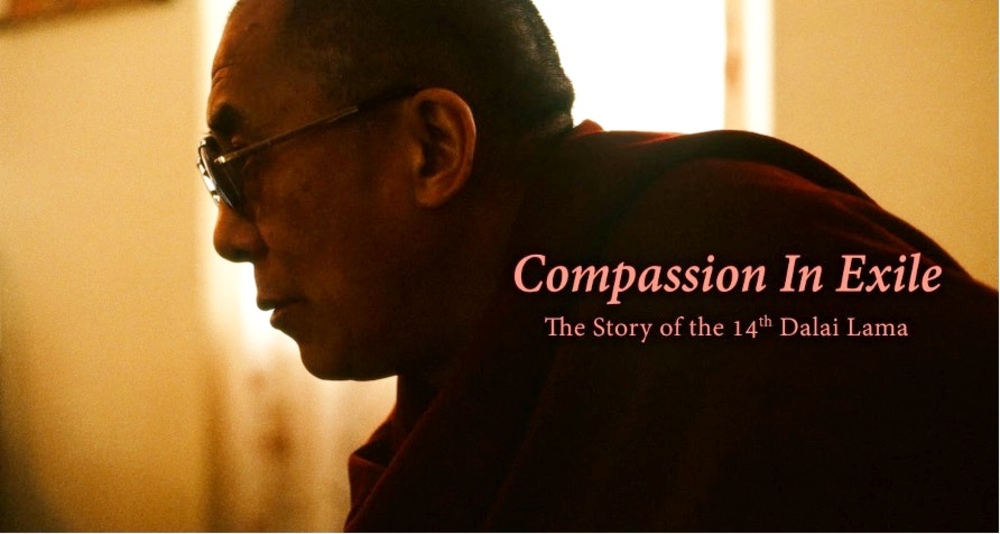BUDDHISTDOOR EN ESPAÑOL
Cinema has emerged as a significant and eloquent medium for exploring and communicating the teachings of Buddhism, offering a rich perspective on this spiritual tradition. Since its inception, it has been a powerful tool for telling stories that captures the essence of Buddhism and its impact on world culture. The following selection of films, while not exhaustive, covers a wide range of genres and styles, reflecting the reach of Buddhadharma in diverse cultures and its continued relevance.
These cinematographic works provide a detailed view of the Buddhist tradition, exploring themes such as compassion, impermanence, meditation and the search for enlightenment. Through visual narratives, filmmakers have been able to adapt the Buddha's ancient wisdom to contemporary contexts, making it accessible to global audiences. Movies like Little Buddha, Samsara And Milarepa demonstrate how cinema can be a vehicle for spiritual reflection and personal introspection. Not only do they entertain, but they also invite spectators to reflect on their own lives and the world around them, fostering a deeper understanding of Buddhist spirituality and culture.
——————————————————————————
Title: A Geshema Is Born
Director: Malati Rao
Year: 2019
Country: India
Language: English
Genre: documentary
Tradition: Tibetan Buddhism
Theme: Graduation of the First Women Geshema in Tibetan Buddhism.
Synopsis: This documentary tells the inspiring journey of a group of Tibetan nuns who manage to obtain the degree of Geshema, an academic recognition equivalent to a doctorate in Buddhist studies. The film explores how this achievement impacts the hierarchical structure of Tibetan Buddhism and promotes gender equality within this religious tradition.
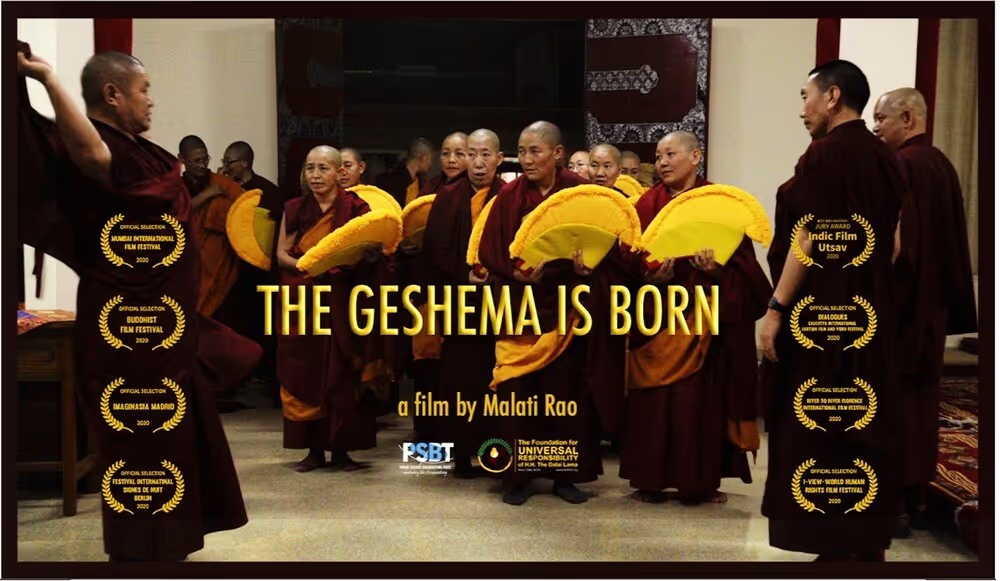
Title: Satya: A Prayer for the Enemy
Director: Ellen Bruno
Year: 1997
Country: USA
Language: English
Genre: documentary
Length: 27 minutes
Tradition: Tibetan Buddhism
Theme: non-violence, peaceful resistance, fight for human rights.
Synopsis: Through interviews and testimonies, the documentary highlights the dedication of Tibetan nuns to preserving their culture and spirituality.
——————————————————————————-
Title: A Thousand Mothers
Director: Kim Shelton
Year: 2017
Country: Myanmar
Language: Burmese
Genre: documentary
Length: 39 minutes
Tradition: Theravāda Buddhism
Theme: Monastic Life and Spirituality
Synopsis: The documentary provides an up-close view of the daily lives of Buddhist nuns in Sagaing, Myanmar. It explores their commitment to spiritual practice and community life in the monastery, highlighting the challenges and rewards they face in following the monastic path within the Theravāda tradition.
———————————————————————————
Title: A Walk of Wisdom
Director: Victoria Holt
Year: 2004
Country: USA
Language: English
Genre: documentary
Length: 1 hour and 12 minutes
Tradition: Buddhism
Theme: life and personal growth
Synopsis: This documentary is an exploration of life and personal growth through the teachings of Buddhism. By immersing themselves in Buddhist practices and principles, it invites viewers to reflect on their own personal and spiritual development. Through inspiring stories and ancient wisdom, it shows how Buddhist principles can serve as a guide to a better understanding of oneself and greater wisdom in everyday life.
——————————————————————————-
Title: A Zen Life: D.T. Suzuki
Director: Michael Goldberg
Year: 2006
Country: USA
Language: English
Genre: documentary
Length: 77 minutes
Tradition: Zen Buddhism
Theme: Life and Legacy of Daisetsu Teitaro Suzuki
Synopsis: The documentary explores the life and work of Daisetsu Teitaro Suzuki, a prominent Japanese scholar who played a crucial role in introducing Zen to the Western world. Through interviews, archival material and comments from people who knew him, his influence on Western thinkers and his contribution to the understanding of Zen are examined.
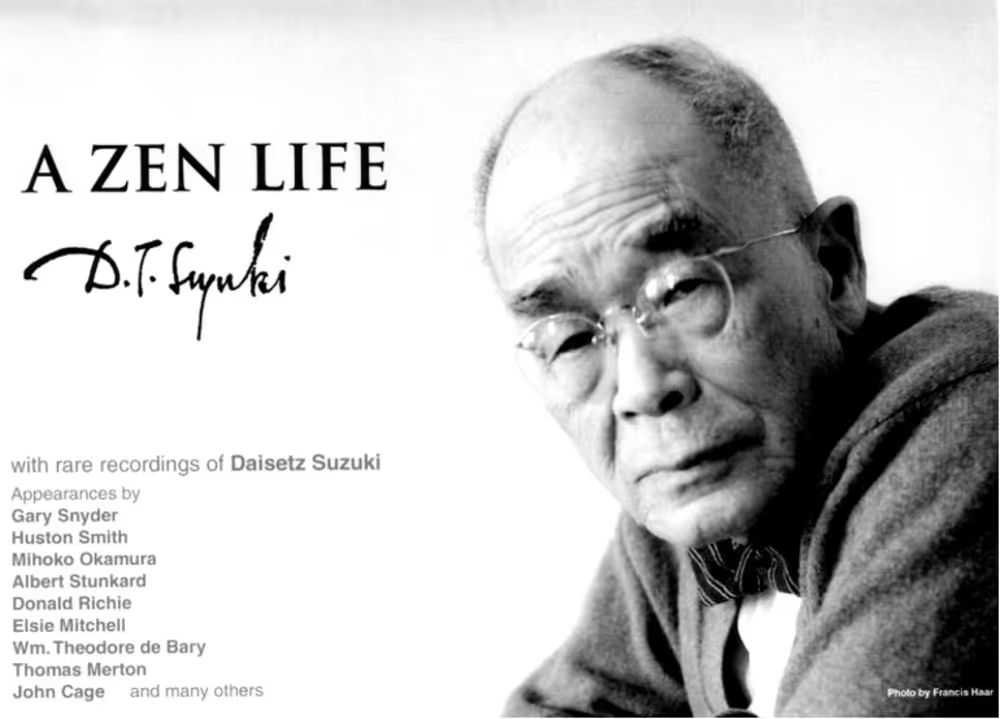
Title: Akong: A Remarkable Life
Director: Chico Dall'Inha
Year: 2017
Country: United Kingdom
Language: Tibetan
Genre: documentary life of Akong
Tulku Rinpoche
Length: 96 minutes
Tradition: Tibetan Buddhism
Theme: The Life of Akong Tulku Rinpoche
Synopsis: The documentary chronicles the life of Akong Tulku Rinpoche, a prominent teacher of Tibetan Buddhism. It traces his journey from his birth in Tibet to his fundamental role in the establishment of Samye Ling in the United Kingdom, the first Tibetan Buddhist monastery in Europe. Throughout its history, its influence and legacy in the spread of Tibetan Buddhism in the West stand out.
————————————————————————————
Title: Alexandra David-Neel: One Woman's Journey
Directors: Jeanne Mascolo de Filippis and others
Year: 1998
Country: France
Language: French
Genre: documentary
Length: 52 minutes
Tradition: Buddhism
Theme: Life and Travels of Alexandra David-Neel.
Synopsis: The documentary provides an overview of the life and travels of Alexandra David-Neel, a pioneer in the exploration of Tibet and other Asian regions. Through historical images, interviews and analysis, the film highlights its impact on Western understanding of Asian culture and spirituality. Her legacy as an explorer and writer continues to influence interest in Buddhism and Eastern cultures.
———————————————————————-
Title: Alms
Director: Qin Zhao
Year: 2015
Country: China
Language: Chinese
Genre: documentary
Length: 88 minutes
Tradition: Buddhism, Chinese Buddhism.
Theme: Life of Buddhist Monks and the Practice of Asking for Alms
Synopsis: The film explores the lives of Buddhist hermits in the Zhongnan Mountains, who dedicate themselves to Chan Buddhism in isolation. It reveals their motivations, challenges and the deep search for enlightenment that they undertake away from the hustle and bustle of the modern world. This film provides a unique perspective on how these monks find meaning and inner peace through simplicity and devotion.
——————————————————————————-
Title: An Ocean to Cross
Director: Kei Kumai
Year: 1980
Country: Japan
Language: Japanese
Genre: film
Length: 143 minutes
Tradition: Japanese Buddhism
Theme: Life and Work of Gan Jin
Synopsis: Relates the inspiring story of the Buddhist monk Gan Jin and his challenging journey to Japan during the Nara period. The film highlights his significant contribution to the introduction and expansion of Buddhism and Chinese culture in Japan. In addition to its impact on the country's religious and cultural history, the film explores its profound spiritual journey, offering a reflection on perseverance and cultural exchange.
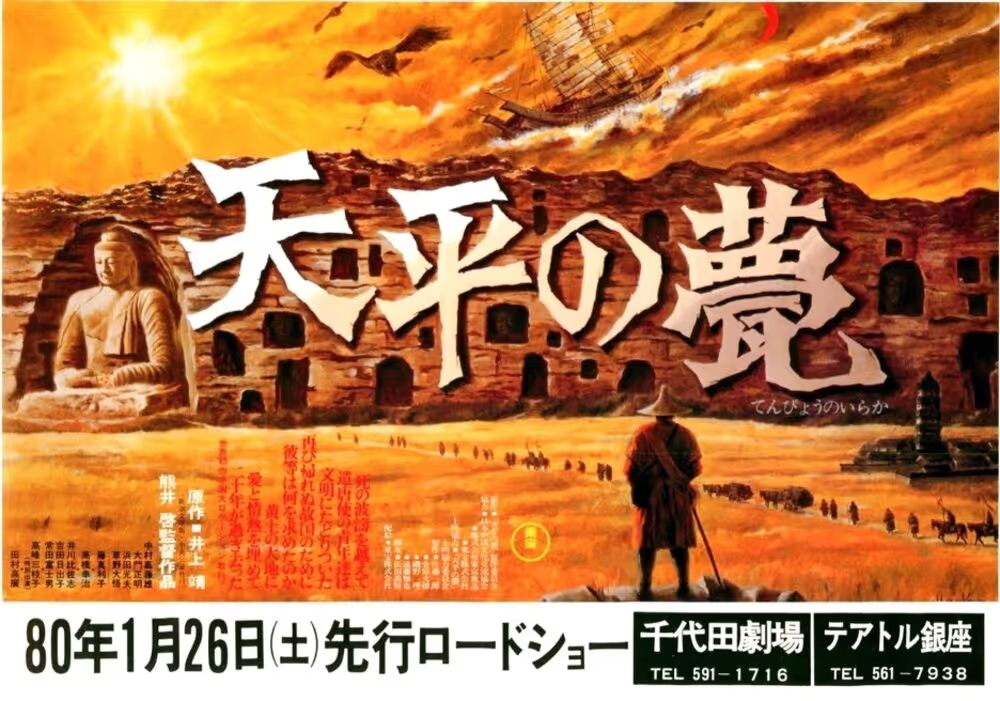
Title: Angry Buddha
Director: Stefan Ludwig
Year: 2016
Country: Hungary
Language: Hungarian
Genre: documentary
Length: 90 minutes
Tradition: Buddhism
Theme: Buddhism; Roma youth; social transformation
Synopsis: Follow a group of young Roma as they embark on both a spiritual and educational journey through the teachings of Buddhism. We see how these principles provide them with tools to face the discrimination and social challenges they face in their daily lives. Along the way, young people seek to develop a sense of identity and purpose, taking advantage of Buddhist teachings to overcome obstacles and improve their lives.
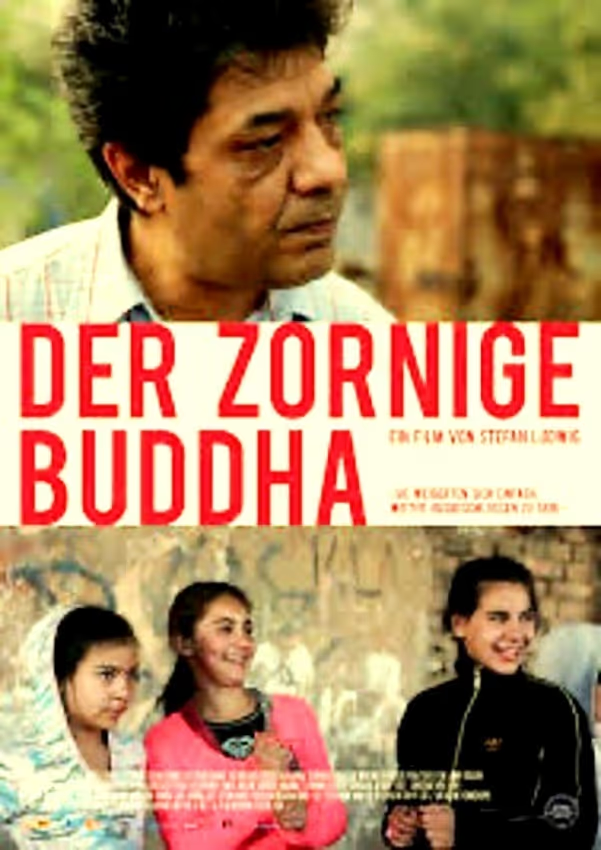
Title: Angulimala
Director: Sutape Tunnirut
Year: 2003
Country: Thailand
Language: Thai
Genre: film
Length: 105 minutes
Tradition: Theravada Buddhism
Theme: Theravada Buddhism, Redemption, Compassion and Personal Transformation
Synopsis: It tells the story of a notorious bandit and murderer who becomes a devoted follower of the Buddha. The plot follows the journey of personal transformation of Angulimala, whose name is translated as a “necklace of fingers” due to her habit of collecting the fingers of her victims. After a revealing encounter with the Buddha, he undergoes a profound spiritual change and decides to become a monk.

Title: Autumn in the Himalayas
Director: Malgorzata Skiba
Year: 2008
Country: Poland
Original language: Polish
Length: 50 minutes
Genre: documentary
Tradition: Buddhism
Theme: impermanence, connection with nature and the preservation of Buddhist traditions.
Synopsis: This documentary presents a thoughtful view of life in Buddhist monasteries located in the Himalayas during the autumn season. With an observational approach, the director documents how nature in transformation is intertwined with monastic life, highlighting daily rituals, meditation practices and the connection of monks to the local community.
———————————————————————————
Title: Becoming Who I Was
Directors: Chang-Yong Moon and Jin Jeon
Year: 2016
Country: South Korea
Original language: Tibetan
Genre: documentary
Duration: not available
Tradition: Tibetan Buddhism
Theme: Tibetan Buddhism, Monastic Life, Reincarnation
Synopsis: The documentary follows the story of a boy in North India recognized as the reincarnation of a Tibetan lama. He explores his relationship with an elderly monk who guides him on his journey to his original monastery in Tibet. Through breathtaking landscapes and intimate moments, the documentary offers an in-depth view of Tibetan Buddhist traditions and the challenges of keeping them in exile, highlighting themes of identity, human connection and spiritual search.
——————————————————————————-
Title: Bhikkhunī — Buddhism Sri Lanka Revolution
Diretor: Małgorzata Dobrowolska
Year: 2018
Country: Poland
Original language: English
Genre: documentary
Duration: not available
Tradition: Buddhism
Theme: Theravada Buddhism, female monastic life,
Synopsis: The documentary investigates the revival of the ordination of Buddhist nuns (Bhikkhunis) in Sri Lanka, an innovative movement within Theravāda Buddhism. It shows the challenges and controversies associated with this change in tradition, highlighting women's struggles to achieve equality. The documentary offers a perspective on how this revolution is transforming the landscape of Buddhism in Sri Lanka and its impact on society in general.
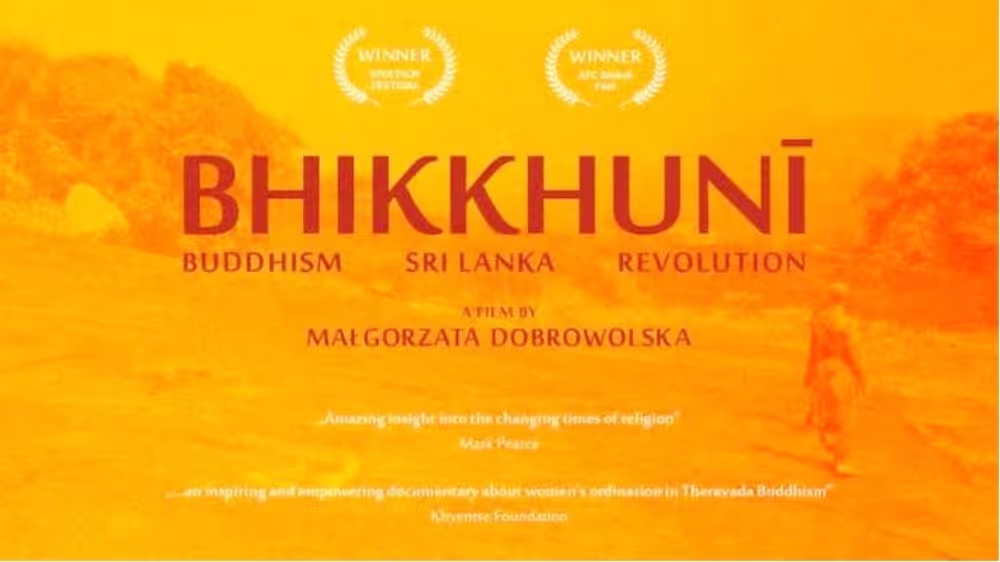
Title: Bill Moyers on Faith & Reason: Pema Chodron
Presenter: Bill Moyers
Year: 2006
Country: USA
Original language: English
Genre: documentary (series episode)
Length: 60 minutes
Tradition: Tibetan Buddhism
Theme: Pema Chödrön, suffering and wisdom, Buddhist teachings.
Synopsis: This episode of the documentary series “Bill Moyers on Faith & Reason” features an interview with Pema Chodron, an American Buddhist nun and teacher in the Shambhala Buddhist tradition. The conversation explores the intersection between faith and reason, focusing on how Buddhist concepts can help to face life's challenges. Chodron discusses topics such as mindfulness, meditation, the nature of suffering and compassion, offering perspectives on how Buddhist teachings address fundamental human issues.
——————————————————————————
Title: Blessings: The Tsoknyi Nangchen Nuns of Tibet
Director/Producer: Pundarika Association
Year: 2009
Country: USA
Original language: English
Genre: documentary
Length: 87 minutes
Tradition: Tibetan Buddhism
Theme: Tibetan Buddhism; female monasticism.
Synopsis: The documentary shows the life and spiritual practices of the Tsoknyi Nangchen nuns in Eastern Tibet. It offers an intimate look at their daily routines, meditation practices and the challenges they face in their isolated environment. It highlights the nuns' dedication to their spiritual path and the empowerment they find through their religious practice, shedding light on the unique and often overlooked contributions of women in Tibetan Buddhism.
———————————————————————————
Title: Bones of the Buddha
Director: David Ash.
Year: 2013
Country: United Kingdom
Original language: English
Genre: documentary
Length: 60 minutes
Tradition: Buddhism
Theme: relics, life of the Buddha, history
Synopsis: This documentary investigates the intriguing discovery of a stone chest by Peppé, which contained jewelry, gold and urns, one of which could hold the Buddha's ashes. It delves into the authenticity and meaning of these findings, calling on experts in archaeology, history and Buddhism to unravel this enigma. Combining historical detective work with modern scientific analysis, the film offers a fascinating perspective on the historical life of the Buddha and the possible contemporary implications of this revolutionary discovery.
——————————————————————————-
Title: Brilliant Moon: Glimpses of Dilgo Khyentse Rinpoche
Director: Neten Chokling
Year: 2010
Country: USA
Original language: Tibetan
Genre: documentary
Length: 58 minutes
Tradition: Tibetan Buddhism
Theme: Life and Legacy of Dilgo Khyentse Rinpoche
Synopsis: Celebrate the life and teachings of Dilgo Khyentse Rinpoche, a prominent teacher of twentieth-century Tibetan Buddhism. Narrated by Richard Gere and Lou Reed, the film uses archive material, photographs and interviews with influential figures such as the Dalai Lama to provide an intimate view of his life. It considers Rinpoche's legacy, highlighting his compassion and wisdom, and reflects on the transmission of spiritual knowledge in the context of Tibetan Buddhism.
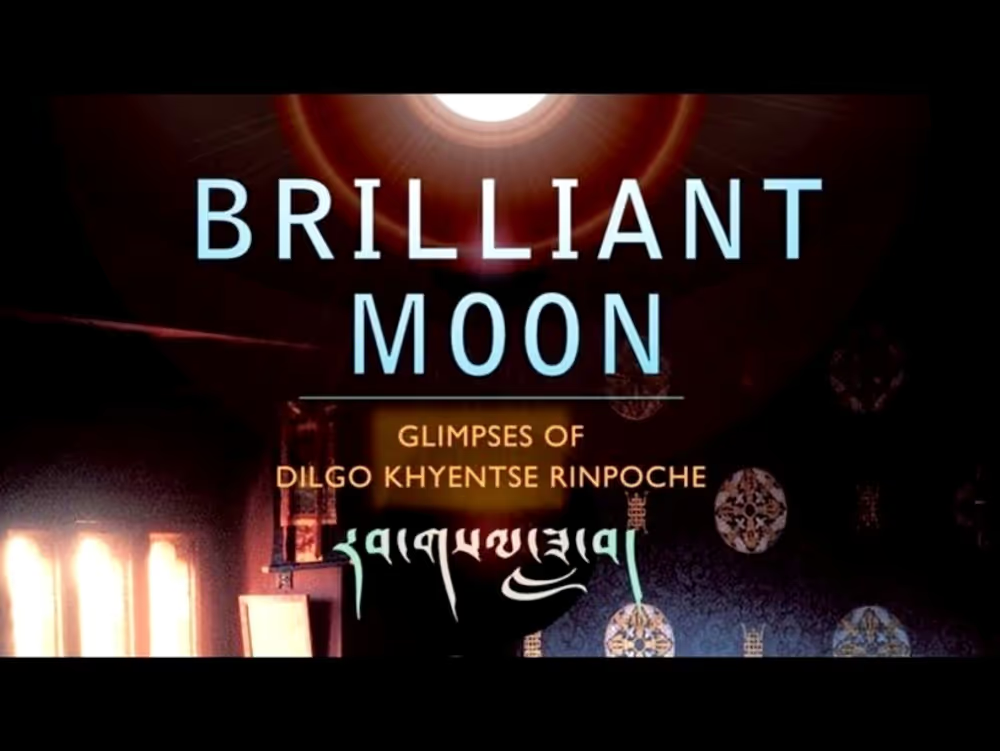
Title: Buddha in Africa
Diretor: Nicole Schafer
Year: 2019
Country: South Africa
Original language: English
Genre: documentary
Length: 93 minutes
Tradition: Buddhism
Theme: Buddhism in Africa
Synopsis: This is a documentary directed by Nicole Schafer that examines the cultural interaction between African traditions and Chinese Buddhist values in Malawi. The film follows Enock Alu, a young Malawian man living in a Chinese Buddhist orphanage, as he tries to balance his African roots with the Buddhist education he receives. Throughout the life of Enock, the documentary offers a unique vision of how Eastern philosophies are introduced and adapted to African contexts, addressing issues such as cultural preservation, identity and the impact of globalization.
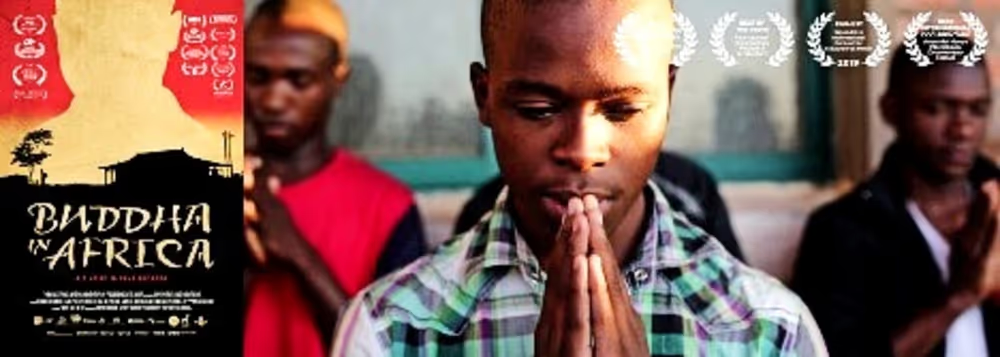
Title: Buddha's Painter
Director: not specified
Year: 2004
Country: not specified
Original language: not specified
Genre: documentary
Duration: not specified
Tradition: Buddhism
Theme: Buddhist art
Synopsis: This is a documentary that considers the world of Buddhist art and its spiritual meaning, focusing on the life and work of a painter dedicated to creating traditional Buddhist thangkas. It explains Thangkas' meticulous painting process and the spiritual connection between the artist and his work. Through this artistic journey, the documentary examines themes such as devotion, artistic expression and the preservation of cultural heritage within the Buddhist tradition, illustrating the intersection between art and spirituality in Buddhism.
——————————————————————————
Title: Buddhist Nuns of Mount Emei
Director: Liang Bibo
Year: 1995
Country: China
Original language: Chinese
Genre: documentary
Length: 31 minutes
Tradition: Chinese Buddhism, Chan/Zen
Theme: female monastic Buddhism, women and Buddhism
Synopsis: “Buddhist Nuns of Mount Emei” describes the spiritual practices, daily life and challenges faced by these nuns in their dedication to Buddhism. The film highlights her commitment to meditation, to community service, while reflecting on the role of women in Buddhism and the preservation of traditions in a changing world.
——————————————————————————
Title: Carving the Divine
Director: Yujiro Seki
Year: 2017
Country: Japan
Original language: Japanese
Genre: documentary
Length: 54 minutes
Tradition: Japanese Buddhism
Theme: Japanese art
Synopsis: Through this documentary, we learn about the world of Buddhist statue carvers in Japan, a profession with 1400 years of history. It offers a vision of the process of creating these sacred statues, from the selection of wood to the finishing touches, showing teachers and apprentices. Through interviews and scenes of daily work, the film addresses the relationship between Buddhism and contemporary Japanese society, the role of art in spirituality, and the challenges of keeping ancient traditions alive in a modern and increasingly secular Japan.
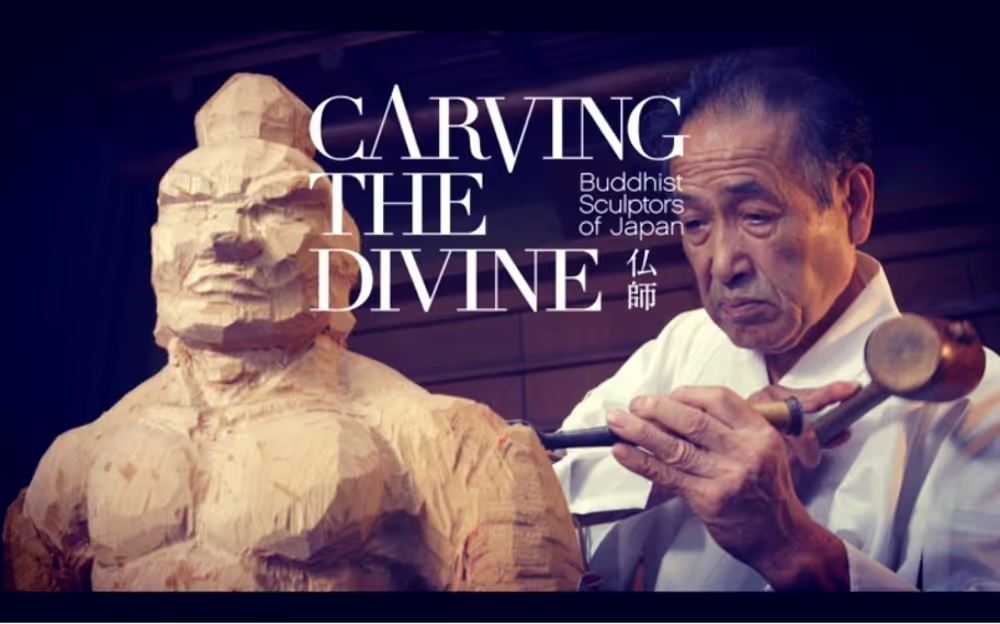
Title: Cave in the Snow with Tenzin Palmo
Diretor: Vicki Mackenzie
Year: 1999
Country: United Kingdom
Original language: English
Genre: documentary
Length: 52 minutes
Tradition: Tibetan Buddhism
Theme: Life of Tenzin Palmo
Summary: This is a documentary about the extraordinary life of Tenzin Palmo, a British Buddhist nun who spent 12 years meditating in solitude in a Himalayan cave. Nl chronicles his spiritual journey from London to his cave retreat, offering an in-depth look at the practice of Tibetan Buddhism and the search for enlightenment. Through interviews and images of the places where she lived, the film addresses issues such as the role of women in Buddhism and the tension between tradition and modernity in spiritual practice, presenting a unique vision of a life dedicated to Buddhist practice.
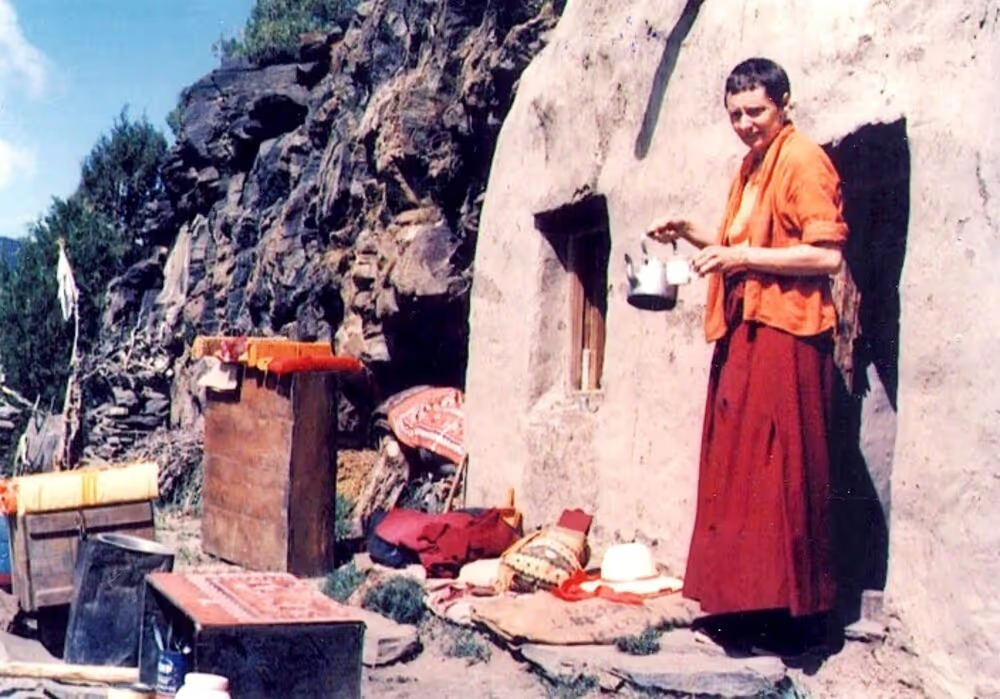
Title: Cherry Blossoms (Kirschblüten — Hanami)
Diretor: Doris Dörrie
Year: 2008
Country: Germany
Original language: German
Genre: drama
Length: 127 minutes
Tradition: Zen Buddhism
Theme: Transience of Life, Philosophy of Zen.
Synopsis: This film tells the story of Rudi, a Bavarian man who, after the death of his wife Trudi, decides to travel to Japan. During her stay, Rudi delves into Japanese culture and the principles of Zen Buddhism, learning to appreciate the transience of life, symbolized by cherry blossoms. The film intertwines German and Japanese cultures, offering a profound reflection on grief, self-discovery and the ephemeral beauty of existence, framed in the aesthetics and philosophy of Zen.
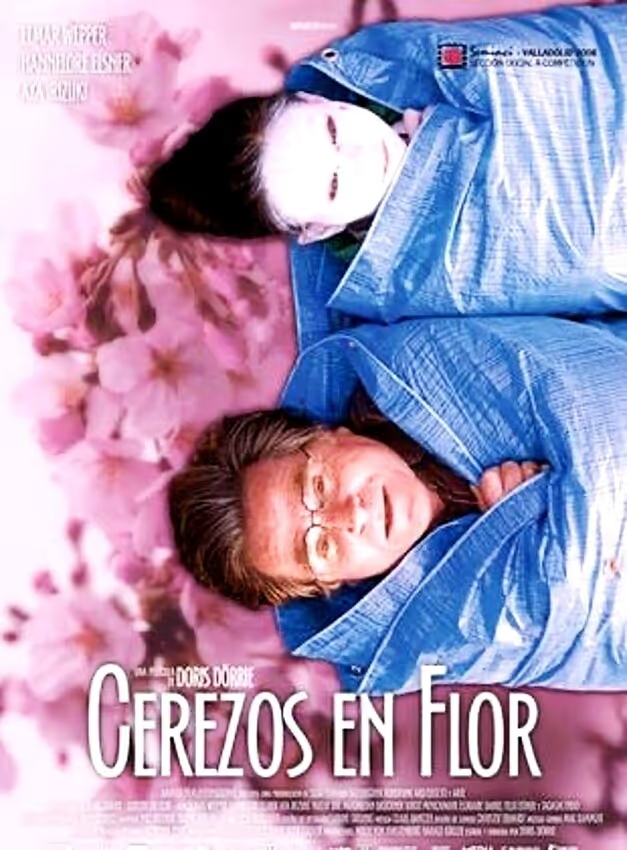
Title: Choice for a Chinese Woman: Enlightenment in a Buddhist Convent
Director: Krauter, Uwe
Year: 1993
Country: Germany/China
Language: Chinese
Genre: documentary
Length: 36 minutes
Tradition: Chinese Buddhism; Chan/Zen
Theme: Spiritual Enlightenment, Monastic Life, Personal Choices
Synopsis: This documentary explores the life of a Chinese adolescent who seeks enlightenment in a Buddhist convent. Through her spiritual journey, her personal decisions and the teachings of Buddhism are examined in a contemporary context.
——————————————————————————
Title: Cloud Atlas
Director: Lana Wachowski, Lilly Wachowski, Tom Tykwer
Year: 2012
Country: United States, Germany
Language: English
Genre: film; science fiction, drama
Length: 172 minutes
Tradition: Epic Narrative
Theme: Reincarnation, Interconnection of Lives, Impact of Actions Over Time
Synopsis: The film weaves together multiple stories across different eras, exploring how the actions and decisions of individuals affect others in the past, present and future. Each story is connected in a thematic way, showing the interconnection over time.
——————————————————————————
Title: Compassion in Exile: The Story of the 14th Dalai Lama
Director: Mickey Lemle
Year: 1993
Country: United States
Language: English
Genre: documentary
Length: 60 minutes
Tradition: Tibetan Buddhism
Theme: Exile, Spiritual Leadership, Human Rights
Synopsis: This documentary chronicles the life of the 14th Dalai Lama, focusing on his exile from Tibet and his role as a spiritual leader and defender of human rights. Through interviews and archival material, his message of compassion and peace is explored.
